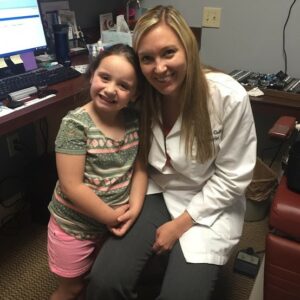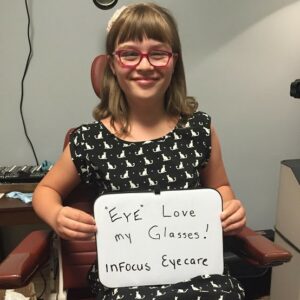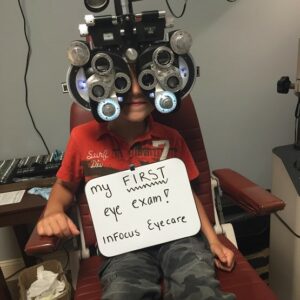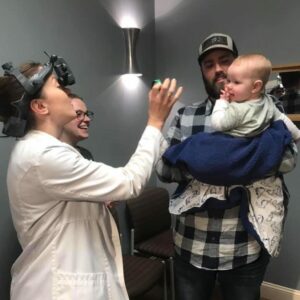Pediatric Eye Exams

-
The American Optometric Association recommends that children have their eyes examined by 6 months, between the ages of 3 and 5, before entering first grade and then annually unless other issues are identified. The comprehensive exam is made up of several components designed to:
- Evaluate the functional status of the eyes and visual system, taking into account each child's level of development
- Assess ocular health and related systemic health conditions
- Establish a diagnosis and formulate a treatment plan
- Counsel and educate parents/caregivers regarding their child's visual, ocular, and related health care status, including recommendations for treatment, management, and preventive care
Vision conditions/disorders are the most common disabling factor in children according to the CDC. Unfortunately, undue reliance on vision screening by pediatricians or other primary care physicians may result in the late detection of diplopia (double vision) and other vision disorders. One study found that only 26 percent of children failing the American Academy of Pediatrics visions screening guidelines were referred for a professional eye examination. Early detection and prevention are critical to a child’s overall health. By failing to detect and treat these conditions, children are at risk for a lifetime of poor vision or blindness. As a result, developmental milestones may not be met, low self-esteem, anxiety and poor academic achievement are often present and can continue into adolescence and adulthood.




-
Roughly, 1 out of every 4 children has a vision problem. Those with vision issues often do not understand that a problem is present because they do not know their vision is abnormal. For example, Convergence Insufficiency (CI) is a common binocular vision disorder where the eyes do not work together especially for near tasks. The faraway vision may be excellent but reading is often compromised. Typical symptoms include difficulty concentrating, short attention span, fatigue or falling asleep while reading, poor comprehension, words that appear to move, float, swim, or jump on the page. Frequently, the child is misdiagnosed with behavior problems, avoidance, attention deficits and hyperactivity when the root cause is a vision related issue. Schedule a Comprehensive Eye Exam today and learn how Vision Therapy could help your child.
Preparing for Your Child's Exam
We know that the first visit to an eye doctor can be intimidating for your child. Our staff and Doctors do their best to make your family feel welcome
and at ease through the visit. We want this exam to be an experience that is fun and exciting!
Please enjoy these printable activities for your child's exam.
Frequently Asked Questions
Vision Screenings are given in a pediatrician's office or at a school. These screenings can miss many vision problems because they are only designed to check distance vision. Vision Screenings should not be considered the same as an eye exam. Our Comprehensive Eye Exam is a full medical evaluation of your eye health and assessment of the visual system by a highly qualified optometrist.
The dilatation drops are an important part of a pediatric Comprehensive Eye Exam. To be able to get the most accurate measurements and to be able to perform a complete eye health assessment, it is important that we dilate. We understand this is often a source of fear during an exam, but our providers will do everything possible to make your child comfortable so the experience is a positive one.
The American Optometric Association recommends that children have their eyes examined by 6 months, between the ages of 3 and 5, before entering first grade and then annually unless other issues are identified.
We accept most major insurance plans; please call your insurance carrier for benefit details. We are providers for State of NH Medicaid. American Eyecare, our on-site optical shop also accepts the State of NH Medicaid which typically covers new lens and frames once a year.
